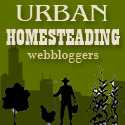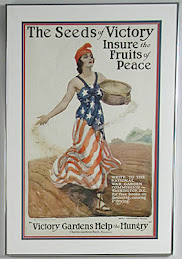I had to get my Independence Days Blog out of my system before I could concentrate on posting for my own challenge. I'm just too trained.
I have always felt strongly about community. I would even say it is one of the key cornerstones of preparedness. The bunker type survivalists have been with us for many years, and we can lear something from them, but the kind of people finding each other in cyberspace, encouraging one another, supporting each other giving ideas to one another are those who are not only picking up on the real need for preparedness but are willing to form community in real life as well.
Being a part of a community - say 5 to 40 (with 40 maybe too high) families has been the rule of thumb for the success of people since before we stood upright out on the savannas. The current model of city and suburban living is a formulation of the Industrial Age, and by the rates of people who feel disconnected and incomplete, it doesn't seems to be meeting the needs of a communal species.
I want to dip into the Industrial Revolution for a moment longer because I think that that time represents a critical turning point in the structure of people's living arrangements and sense of community (range 1760's to 1850's) from what it was from human origins. During the industrial revolution, the birth rate increased dramatically as child mortality decreased, and people moved from an an analog agrarian based economy to, well, an industrial based society. Trains moved people easily and they moved moved from their roots to the cities, from the land to the factory and got mixed up. Machines became the new rulers (Ludd, anyone?). During these 100 years, we see the rise of religious fundamentalism, a knee jerk response to the rule of science and technology including Darwin.
Move forward again another 100 years and find ourselves post WW II, the 1950's were times of great industrial 'advancements'. However, religion still ruled as the center of the social world until then. Looking back to a time I didn't know, it seems as if expansion would go forever. Add another decade to the time sequence and we have a restructuring of society, leaving the structures of organized religion, the questioning of social boundaries. I think everything we've been doing over the last 40 years has been a response to this. Social systems were disrupted and never quite put into place. Youth, who used to have an important role in the family are now treated as little emperors while the parent's work is disjointed from home life. And as spoiled as our kids are, their now long and extended childhood is not regarded as having too much contribution toward larger society. There aren't many real rights of passage left except getting a driver's licence. I really see gang activity as the need for youth to have structure, social expectation and to make an impact in the world. Hell, even a dog will get destructive left alone.
What does this have to do with the coming age? Well, people are not wired to be disconnected from families and the land. We don't get to have unlimited expansion in a finite world - the basic math doesn't add up. Whether the Great Change comes at the end of this challenge ;-} or after we're headed down the slippery slope of peak oil, we may just get the opportunity to rework some of those missing connections.
We who connect through these blogs, CSA, permaculture, and all the good work that's going on out there are the ones who are able to lay some foundations for the age to come. It sure won't be those who have laid themselves up in lonely bunkers or those who won't let go of life as we've already known it until it's long gone.
Building community takes risk. It always does. We risk being rejected. We risk getting in with a bunch of nut-cases or hurtful people, we risk being ripped-off. I find that it's easy to find like-minded people here, on the Internet but we're pretty spread out. Depending on your community, it might not be so easy elsewhere. Where I am is an oil boom town and, I feel as if I'm preparing for a hurricane during Marti Gras. I have to find a fine line between self-disclosure and what others are prepared to hear. For those who have a wider base of willing folks are to build community, then provide the platform. What skills to you have to share? What neighbors would be receptive to outreach? What needs do you have? Can you have a dinner cooking group, a bike shop, a took lending group....(keep in mind you too have to be open to receive, else the scales aren't balanced). My garden owners and I had better not talk religion, politics, economics, or ecology, but we know this and have formed a wonderful bond of real concern and regard for the other.
I kind of like where I am but I'd rather not be trying to make community here. I'd rather be living in the community Eric Brende outlined in his book, "Better Off". I'd rather be living with you all as neighbors, separated by little farms. But we likely won't move, we have work and a house and have been building community for a year now. We'll just have to adapt, and build community right here, down town Smalltown, right wing, USA.
The thing is, that building community is every bit as important as building a food store. We humans don't do well without community. One person can't cover every eventuality. At some point we need one another. When resources are limited everyone is better off working together. We're all in this together.
Friday, October 3, 2008
Subscribe to:
Post Comments (Atom)




















3 comments:
I keep learning lessons about building community- And have been trying- going to sustainable Burien classes, taking classes at Seattle Freeschool, walking the neighborhood and talking to neighbors.
As someone who will be moving in a month (assuming your timeline here isn't right), I'm worried about building community. It is hard when you are new to an area.
Christy, perhaps it is an opportunity. How many times do you get the chance to go ring your nieghbor's bell and introduce yourself?
I know, we've moved a bit in the last 6 years. We're homebodies at heart but have been out trying our wings before roosting.
Post a Comment